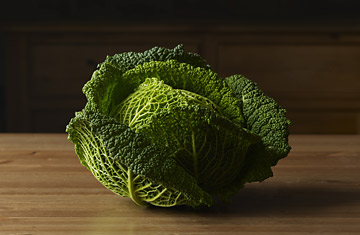
During Russia's fat years, waistlines expanded almost as quickly as oil and gas exports. But now that lean times have returned, Russia's Ministry of Health is encouraging a revival of a diet full of cabbage, sour milk and other traditional foods to fatten Russians' wallets and slim their bellies. The advice, contained in a new Ministry report, is aimed at helping a population hit by rising unemployment, a falling ruble and ever-increasing food prices.
The ministry says the diet, which is heavy on hearty Russian foods like porridge, cabbage salad, sour cream, mashed potatoes, vegetables, whole grain bread and fish, will cost just $77 a month. "The aim of the diet is so that the people don't panic and know that in any situation there is a way out, including through nutrition," a spokeswoman for the Ministry told TIME. (See pictures of what makes us eat more food)
Since the financial crisis hit Russia late last summer, more than 1.5 million Russians have lost their jobs and the ruble has lost a third of its value. On Friday the State Statistics Service reported that the annualized inflation rate had jumped to 13.9 percent — a four month high. The government predicts that the economy will shrink by 2.2% this year while the cost of buying an average monthly basket of food for an adult male in January was $61.34, up from $53.53 a year earlier. (The average monthly salary in Russia is $490.51, according to state figures.)
Officials are worried that if the price of food keeps rising too fast it could prompt widespread social unrest. The pensions of millions of retired Russians continues to hover below the poverty line and thousands of workers are losing their jobs. At a Communist rally in central Moscow in late February, the increased number of riot police detailed to monitor proceedings was telling of the government's growing fears.
The new diet aims to calm those tensions by easing the pain in people's wallets. And that's not all. "We're also making an effort to use the current crisis ... to change the nation's eating habits," says Alexander Baturin, deputy head of Moscow's Institute of Nutrition, a part of the Academy of Medical Sciences.
The Health Ministry reports that Russian adults have added an average of 4.5 pounds (2 kg) over the past ten years, while children have added a little over two pounds (1 kg). The cobbled-together list of advice offers ways to help that, including the suggestion that people should take time to scrub their potatoes and keep the skins on rather than peeling them in the usual style. "Our wise ancestors boiled and baked their potatoes with their skins," the advice scolds.
Gennady Onishchenko, the head of the Federal Consumer Protection Service, on whose website the report is published, said that foods such as sausages and hotdogs, made popular during the shortages experienced in Soviet times, should now be eliminated. So too should typically Western foods such as potato chips, hamburgers, pizza and soft drinks. The best way forward, it seems to suggest, is a return to traditional Russian culinary heritage.
Daily Komsomolskaya Pravda dubbed the recommendations the "anti-crisis diet." First published during the start of Orthodox Lent in late February, the fish-heavy diet even has people thinking of religion, the newspaper reported. "The first two apostles, Andrew and Peter, were both fishermen," Father Alexei, a priest in Polenovo just outside of Moscow, told the newspaper. "Therefore, the church has a positive attitude towards eating sea and river [fish]."
